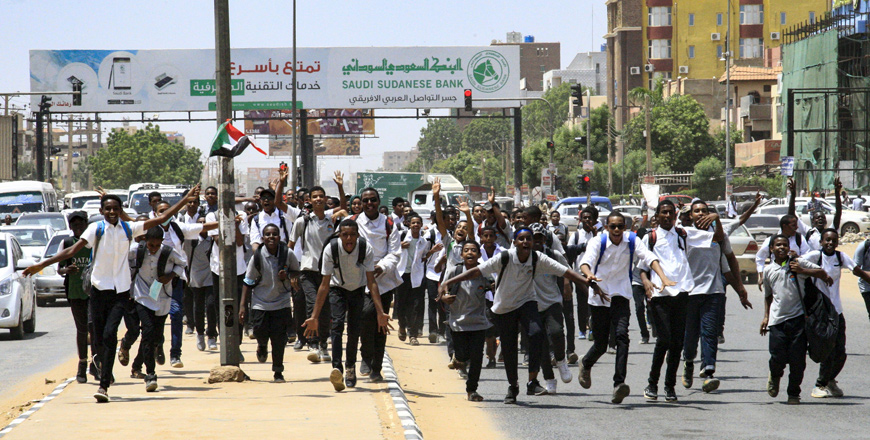KHARTOUM — Sudanese protest leaders cancelled planned talks with the country's ruling generals on Tuesday as hundreds of schoolchildren demonstrated in Khartoum against the shooting dead of five pupils at a rally.
"Killing a student is killing a nation," chanted crowds of schoolchildren, dressed in their uniforms and waving Sudanese flags, in the capital's eastern district of Burri.
Sporadic protests by schoolchildren were also held in other parts of the capital.
Demonstrators accused feared paramilitaries of the Rapid Support Forces of shooting dead the five teenagers on Monday in the central town of Al Obeid at a rally against shortages of bread and fuel.
The killings came a day before protest leaders were due to hold talks with generals on the remaining aspects of installing civilian rule after the two sides inked a power-sharing deal earlier this month.
But three protest leaders said the dialogue would not take place as planned.
"There will be no negotiations today as we are still in Al Obeid," Taha Osman, a negotiator from the protest movement, told AFP by telephone from the town.
"There will be no negotiation today with the Transitional Military Council as our negotiating team is still in Al Obeid and will return only tonight," a second negotiator, Satea Al Haj, said.
Another protest leader told AFP on condition of anonymity that talks would resume after "calm returns to the streets as dialogue was the only way to break the overall political impasse".
The chairman of Sudan’s ruling military council, General Abdel Fattah Al Burhan, condemned the killings.
“What happened in Al Obeid is sad. Killing peaceful civilians is an unacceptable crime that needs immediate accountability,” the chairman of Sudan’s ruling military council told journalists, according to state television.
Crowds of students rallied in Khartoum waving Sudanese flags and chanting: “The people want to fight for the rights of martyrs”.
“We keep silent all the time and they kill us,” said Enas Saifeddine, a 16-year-old high school student.
“The five students of Al Obeid were killed because they were asking for something that is basic like food, water and electricty.”
UN calls for probe
The UN children’s agency UNICEF called on the authorities “to investigate” the killings and hold the perpetrators accountable.
“No child should be buried in their school uniform,” UNICEF said, adding that the pupils killed were between 15 and 17 years old.
Authorities announced a night-time curfew in four towns in North Kordofan state following the deaths in Al Obeid, as the main protest group, the Sudanese Professionals Association, called for nationwide rallies against the “massacre”.
All schools in the state have been told to suspend classes.
“The Janjaweed forces and some snipers, without any mercy, confronted school students with live ammunition,” the SPA said, referring to the RSF which has its origins in Arab militias that were originally deployed to suppress an ethnic minority rebellion that erupted in Sudan’s western region of Darfur in 2003.
The SPA said more than 60 people were wounded in Al Obeid.
Doctors linked to the protest movement say that more than 250 people have been killed nationwide in protest-related violence since December when demonstrations first erupted against now ousted president Omar Al Bashir.
Outstanding issues
The teenagers’ deaths had prompted calls for Tuesday’s planned talks to be suspended.
“We cannot sit at the negotiating table with those allowing the killing of revolutionaries,” Siddig Youssef, a prominent protest leader, said in a statement.
Tuesday’s talks were to cover issues including the powers of the joint civilian-military ruling body, the deployment of security forces and immunity for generals over protest-related violence, according to protest leaders.
The power-sharing deal agreed on July 17 provided for the establishment of a new governing body of six civilians and five generals.
But the publication on Saturday of the findings of an investigation commissioned by the military into the deadly dispersal of a Khartoum protest camp in June has triggered angry demonstrations.
Shortly before dawn on June 3, gunmen in military fatigues raided the site of the weeks-long sit-in outside army headquarters, shooting and beating protesters.
Doctors linked to the protest movement say the raid left 127 people dead and scores wounded.
Protest leaders have rejected the findings of a joint investigation by prosecutors and the ruling military council which concluded that just 17 people were killed on June 3, with a total of 87 deaths between that day and June 10.
